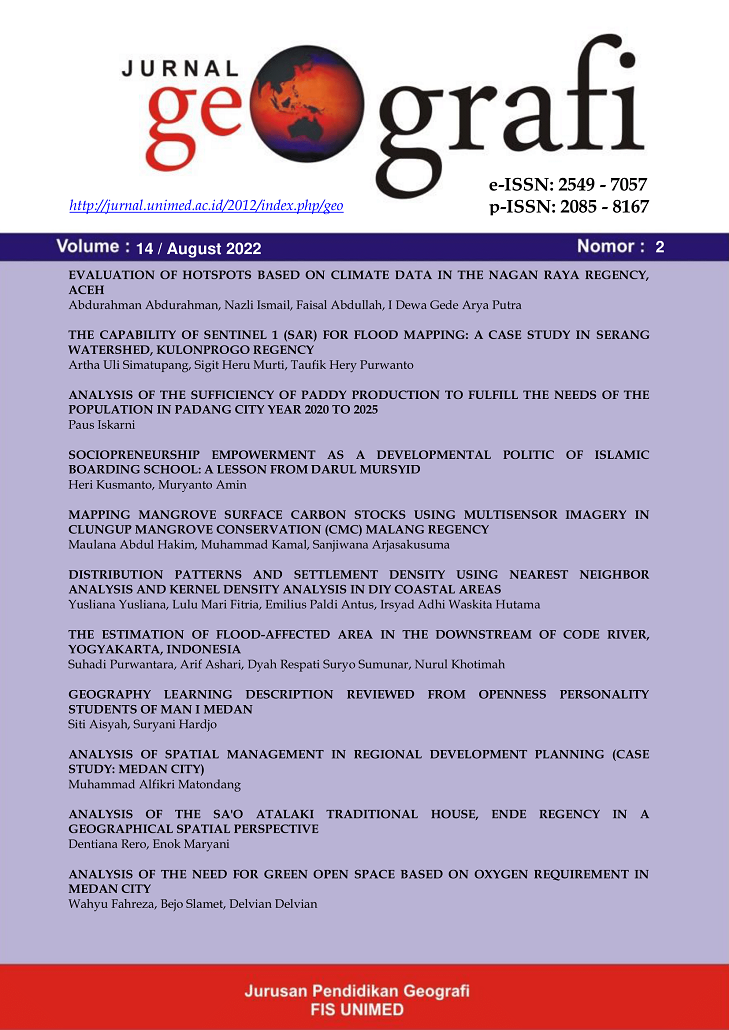SOCIOPRENEURSHIP EMPOWERMENT AS A DEVELOPMENTAL POLITIC OF ISLAMIC BOARDING SCHOOL: A LESSON FROM DARUL MURSYID
DOI:
https://doi.org/10.24114/jg.v14i2.36564Abstract
This study analyses the sociopreneurship empowerment model performed by an Islamic boarding school from the perspective of developmental politics. Darul Mursyid boarding school, an Islamic education institution in the Sipirok district in North Sumatera, has been known to employ this model as a part of its social development efforts in giving economic and social benefits to the Sipirok society. This study was carried out through subsequent descriptive-qualitative research, observation, in-depth interview, and FGD (forum group discussion) methods. The results exhibited that most of the sociopreneurship efforts had been directed at producing agroforestry commodities such as coffee, vanilla, honey, vegetables, etc., along with other economic activities. The existence of Darul Mursyid boarding school greatly supported the financial capabilities of the community. Overall, the findings of this study revealed the critical role of Darul Mursyid's Islamic principles and the founding figures in driving the enhanced sociopreneurship empowerments. This outcome also implicitly exhibited the significant role of Islamic boarding schools despite civil organizations contributing a lot of benefits to society's welfare.Keywords: Development of Politics, Sociopreneurships, Empowerment, Islamic Boarding School, Darul MursyidReferences
Anheier, H. K., Topler, S., & Regina A. List. (2010). International Encyclopedia of Civil Society (Vol. 1). Springer. https://doi.org/DOI 10.1007/978-0-387-93996-4
Appiah, M., Amoasi, R., & Frowne, D. I. (2019). Human Development and Its Effects on Economic Growth and Development. 12(2), 101“109. https://doi.org/https://doi.org/10.21632/irjbs
Arts, B. J. ., Van Bommel, S., Ros-Tonen, M. A. ., & Verschoor, G. M. (2012). Forest-People Interfaces: Understanding Community Forestry and Biocultural Diversity. In Forest-people Interfaces: Understanding Community Forestry and Biocultural Diversity. Wageningen Academic Publishers. https://doi.org/10.3920/978-90-8686-749-3
Atkinson, A. (2017). Monitoring Global Poverty, Report of the Commission on Global Poverty. Washington, DC: World Bank Group.
Choiruzzad, S. A. B., & Nugroho, B. E. (2013). Indonesia™s Islamic Economy Project and the Islamic Scholars. Procedia Environmental Sciences, 17, 957“966. https://doi.org/10.1016/j.proenv.2013.02.114
Ebrashi, R. El. (2013). Social Entrepreneurship Theory and Sustainable Social Impact. Social Responsibility Journal, 9(2), 188“209. https://doi.org/10.1108/SRJ-07-2011-0013
Esfandiar, M. (2022). Islam Nusantara and the Challenges of Political Islam in the Contemporary World: Emphasizing the Views of Abdurrahman Wahid. Islam Nusantara Journal for the Study of Islamic History and Culture, 3(1), 1“29.
Farid, A., & Lamb, M. (2020). English for Da™wah? L2 motivation in Indonesian pesantren schools. An International Journal of Educational Technology and Applied Linguistics, 94, 3“34. https://doi.org/10.1016/j.system.2020.102310
Fisher, M. R., Moeliono, M., Mulyana, A., Yuliani, E. L., Adriadi, A., Kamaluddin, Judda, J., & Sahide, M. A. K. (2018). Assessing the New Social Forestry Project in Indonesia: Recognition, Livelihood and Conservation? International Forestry Review, 20(3), 346“361. https://doi.org/10.1505/146554818824063014
Hamid, Z., Zhang, H., & Sarif, S. M. (2018). Economic Theories of Social Entrepreneurship. International Journal of Accounting, Finance and Business, 2(6), 110“122.
Hani, A., & Suryanto, P. (2014). Dinamika Agroforestry Tegalan Di Perbukitan Menoreh, Kulon Progo, Daerah Istimewa Yogyakarta. Jurnal Penelitian Kehutanan Wallacea, 3(2), 119. https://doi.org/10.18330/jwallacea.2014.vol3iss2pp119-128
Hastasari, C., Setiawan, B., & Aw, S. (2022). Students™ Communication Patterns of Islamic Boarding Schools: The Sase of Students in Muallimin Muhammadiyah Yogyakarta. Heliyon, 8(1), e08824. https://doi.org/10.1016/j.heliyon.2022.e08824
Karim, M. A. (2018). Islam in Indonesia : A Historical Persepective. In Indonesian Journal of Interdisciplinary Islamic Studies (IJIIS) (Vol. 1, Issue 2, pp. 01“17). https://doi.org/10.20885/ijiis.vol1.iss2.art1
Kusmanto, H. (2021). A Comparative Analysis Of Regional Political Model Of Islamic Development In Indonesia And Malaysia. Journal of Legal, Ethical and Regulatory Issues, 24(Special Issue 1), 1“8.
KUSMANTO, H. (2017). Sipil Muslim dalam Transisi Demokrasi di Indonesia. Politeia: Jurnal Ilmu Politik, 3(1).
Lang, R., & Fink, M. (2019). Rural social entrepreneurship: The role of social capital within and across institutional levels. Journal of Rural Studies, 70(June 2017), 155“168. https://doi.org/10.1016/j.jrurstud.2018.03.012
Lateh, M., Hussain, M. D., & Abdullah, M. S. Bin. (2018). Social Entrepreneurship Development and Poverty Alleviation - A Literature Review. Journal of Business and Management, 2(3), 1“11.
Leadbeater, E. (2015). What evolves in the evolution of social learning? Journal of Zoology, 295(1), 4“11. https://doi.org/10.1111/jzo.12197
Mufidah, A. D., & Adi, I. R. (2018). Pemberdayaan Masyarakat Oleh PT Nestle Indonesia Melalui Kelompok Sapi Perah Budi Luhur. Jurnal Ilmu Kesejahteraan Sosial, 19(2), 109. https://doi.org/10.7454/jurnalkessos.v19i2.169
Nurbaiti. (2020). Islamic Education: The Main Path of Islamization in Southeast Asia. Jurnal Pendidikan Islam, 8(2), 345“374. https://doi.org/10.14421/jpi.2019.82.345-374
Palesangi, M. (2012). Pemuda Indonesia Dan Kewirausahaan Sosial. Jurnal Masyarakat Dan Budaya, 1(2), 1“6.
Purnomo, D., Pujianto, T., & Efendi, N. (2015). Unpad “ Ibu Popon Collaboration; A Best Practice in Sustainable Assistance Model for Social Entrepreneurship in Agro-industrial Based SME™s. Agriculture and Agricultural Science Procedia, 3, 206“210. https://doi.org/10.1016/j.aaspro.2015.01.040
Purwana, A. E. (2013). Pembangunan Dalam Perspektif Ekonomi Islam. Justicia Islamica, 10(1). https://doi.org/10.21154/justicia.v10i1.140
Putri, D. L., Annisa, M., Ningrum, L. P., Mursid, M., Amiadji, & Murdjito. (2015). Agro Industrial Cluster Development Strategy Coastal Region District Banyuwangi. Procedia Earth and Planetary Science, 14, 136“143. https://doi.org/10.1016/j.proeps.2015.07.094
Rahmanto, M., Widigdo, M. S. A., & Rozikan. (2018). Reintepretation of islam and civil society empowerment; case of majelis pemberdayaan masyarakat muhammadiyah. Humanities and Social Sciences Reviews, 6(2), 127“132. https://doi.org/10.18510/hssr.2018.6216
Sarkun, M. R. N. (2019). Insight into prophetic Ijtihad: An analysis of Muhammad™s legal thinking. Global Journal Al-Thaqafah, 9(2), 49“56.
Shahid, S. M., & Alarifi, G. (2021). Social entrepreneurship education: A conceptual framework and review. International Journal of Management Education, 19(3), 100533. https://doi.org/10.1016/j.ijme.2021.100533
Soetomo. (2011). Pemberdayaan masyarakat: mungkinkah muncul antitesisnya? Pustaka Pelajar.
Syarkun, M. R. N., & Huda, M. (2020). The role of ahl al-sunnah wa al-jama™ah as manhaj (predecessor) and mazhab (school of thought) on progressing of world™s civilization. Journal of Critical Reviews, 7(2), 707“711. https://doi.org/10.31838/jcr.07.02.130
Taylor, S. J., Bogdan, R., & DeVault, M. (2015). Introduction to qualitative research methods: A guidebook and resource. John Wiley & Sons.
Tolentino, L. L., & Landicho, L. D. (2011). Promoting Sustainable Development via Agroforestry Education: Lessons and Experiences from the Philippines. Journal of Developments in Sustainable Agriculture, 6, 8“19.
Van Alfen, N. K. (2014). Encyclopedia of agriculture and food systems. Elsevier.
Warjio. (2016). Politik Pembangunan: paradoks, teori, aktor dan ideologi. Kencana.
Wibowo, H., & Nulhaqim, S. A. N. (2015). Kewirausahaan sosial: merevolusi pola pikir dan menginisiasi mitra pembangunan kontemporer. Unpad Press.







